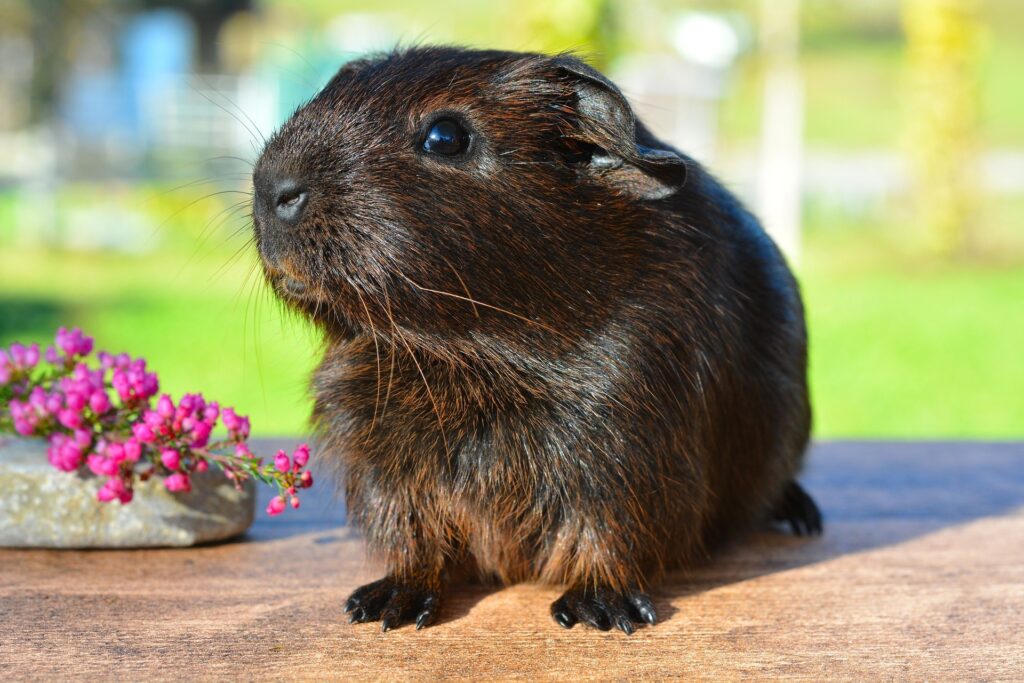Cute, soft, and squeaky, guinea pigs are a favorite when it comes to small pets. But many people think guinea pigs are kind of like fish – set up a cage, provide food, water, and your cleaning services, and that is it. Wrong.
Guinea pigs make wonderful pets, but there is a lot more involved in taking care of a guinea pig than taking care of a fish. Here are some things to know before you get one of these adorable little rodents.
1. Make sure allergies will not be a problem
Some people are allergic to guinea pigs, and some are allergic to the timothy hay that is an essential part of their diet. Rather than having to get rid of a guinea pig because your child can’t stop sneezing, think beforehand about whether allergies could be a problem.
2. Guinea pigs are social
In the wild (yes, there are wild guinea pigs in some parts of the world), guinea pigs are herd animals. Most guinea pigs will not be happy by themselves. If you are thinking about getting a guinea pig, realize you will really need a pair.
With that said, guinea pigs have personalities, and they do not all get along with each other. Getting two at the same time so they can grow up together is a good idea.
3. Guinea pigs need space
Many guinea pigs live in cages that are far too small. Even the largest cages sold in most pet stores do not provide nearly enough space. Two guinea pigs need at least seven square feet of floor space, and they will be much happier and healthier with ten square feet.
4.Guinea pigs live a long time
Unlike some smaller rodents with lifespans of only two to three years, guinea pigs live for around six years. Do not get a guinea pig unless you are willing to make that kind of commitment.
Keep that in mind when considering buying a guinea pig for a child; the child will likely lose interest long before the guinea pig dies, which means a responsible, interested adult will need to take over the care.
5.Guinea pigs have babies at a very young age
Female guinea pigs can get pregnant starting at about three weeks of age. Males can do their part at about the same time. This means that when you adopt a female guinea pig, there is a good chance she could already be pregnant.
And pet store employees are not always knowledgeable enough to accurately determine the sex. If you want to be sure you will not have guinea pig babies, adopt a spayed female from a shelter; another option is to adopt two of the same sex from someone who knows how to tell the difference.
6. Guinea pigs eat a lot
Each guinea pig needs about an eighth of a cup of pellets and one cup of fresh vegetables every day. But the bulk of their diet is timothy hay. And they go through a lot of it.
Guinea pig experts recommend providing an unlimited supply, which means that they should always have hay in their cages. When it is gone, they need more. Plan for at least a pound per week for each guinea pig.
7. Their cages require regular cleaning
With that kind of food consumption, it is not hard to guess that their cages must be cleaned at least once a week. And it is not as simple as just scraping out the bedding and replacing it. The cage needs to be wiped down with a solution of water and vinegar and then dried so no mold will form.
Any items in the cage will need to be cleaned since they will inevitably get contaminated with waste. You may also need to spot clean several times a week, removing any particularly soiled bedding.
8. Guinea pigs need to be groomed
Guinea pigs have “open root” teeth, which means they are always growing. A guinea pig with enough hay to chomp on does not usually need any additional tooth care, but some may need to have their teeth filed occasionally. Toenails, too! And long-haired guinea pigs need to be combed to remove tangles, mats, and bedding from their hair.
9.Guinea pigs are noisy
Guinea pigs are social animals and vocalize a lot – sometimes quite loudly. They are best known for “wheeking” – a squealing or whistling sound they make when they are excited or need something.
Many owners report that their guinea pigs wheek when they are out of hay, when they hear the owner open the refrigerator door, or when they want some attention. And, if you frequently give your guinea pig the scraps from chopping vegetables, expect to hear wheeking every time you start that task.
10. Guinea pigs need to see a vet when they are sick
Many people who would never let their cats or dogs go without medical care never even think to take a guinea pig to the vet. But they need to see a doctor when they are sick, just like other pets.
Moreover, their health is somewhat fragile, so you probably will need to see a vet at some point. Please make sure you have room in your budget to get your guinea pig care when it needs it.
Guinea pigs are cute and cuddly, and they interact with their owners more than some other rodents do. But they are not “feed it and forget it” pets and should not be considered a less time-consuming alternative to a cat or dog. Properly caring for a guinea pig takes time, attention, and money.

